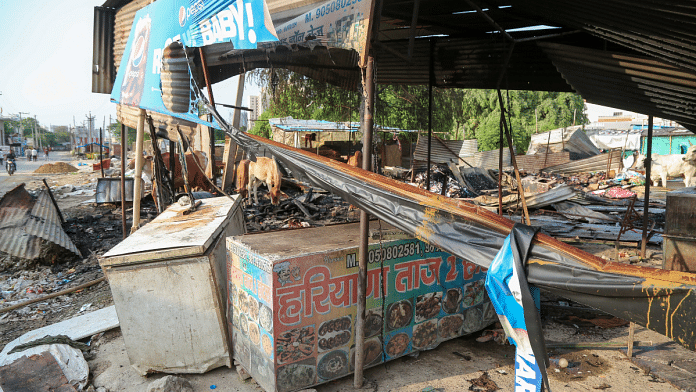The privileged class is capable of outrage, but only when atrocities and violence come knocking on their doors. And only when the smooth functioning of every-day life stutters and stumbles to a halt. This may be a generalisation, but it is reflected in a video that has been doing the rounds on social media after the violence in Nuh and Gurugram.
A clip of a woman from Gurgaon pleading with the authorities to provide housekeeping staff security after communal violence erupted in parts of Haryana has gone viral on social media. The sector 70 RWA president Kiran Kapoor’s heartfelt appeal was not out of concern for their safety, but for the growing piles of garbage in the posh apartment complex she lives in.
The apathy of the privileged has never been more apparent.
“There is garbage in front of our houses,” she said, adding that nobody could even enter the basement because of the mounds of uncollected garbage. Ever since communal riots broke out in Nuh and spread to Gurugram, migrant workers have fled for safety, leaving families in Gurgaon’s towers and apartment complexes and gated societies without any service.
Does Mrs Kapoor think those affected should be provided security? Yes, but so they can resume work.
“The authorities should provide them at least some security so they can come and work,” she says.
Also read: Indians find no shame in Hitler. Bawaal is newest to ‘have fun’ with Nazi references
Two Gurugrams
There are two Gurugrams. One, which is filled with shanties and no proper sewage system or infrastructure, is home to migrants who cater to the other Gurugram —the people living in their towers and gated societies. Theirs is a safe walled world of manicured lawns, swimming pools and clubhouses, all maintained by a small army of domestic workers, chauffeurs, and security guards.
But since the violence, 45,00 migrants have fled Gurgaon after a mosque was burnt to the ground and a young 22-year-old naib imam was killed by a mob.
Now, residents of the glitzier Gurugram are worried. Their immediate concern: who cleans the mess?
Muslims were being attacked. The middle class couldn’t care less about the plight of the people who help their lives function smoothly. For the ilk of Mrs Kapoors, labour is dispensable.
In the video, she can be seen talking about providing security. But what she fails to understand is security outside the burnt mosque in Gurgaon could not prevent a mob from entering the premises or killing another human.
This apathy goes beyond communal divide. Time and again, class clashes unfold in Gurugram when those living outside the gates raise their voices in anger and despair.
Five years ago, Gurugram was on the front page of national dailies—not for its startups and corporate parks—but for a massive uprising of domestic workers in DLF5. It was sparked by an employer allegedly beating up her domestic worker. Hundreds of domestic workers and their husbands gathered outside the walled gates demanding justice.
But the introspection rarely lasts. Atrocities inflicted by the privileged continue, often finding their way in newspapers. A Gurugram couple was booked in February this year for allegedly torturing a minor girl who they had employed as a domestic worker. Last year, a resident of another society was booked for assaulting a security guard because he was stuck in a lift.
The majority of domestic workers are low-income migrants, which make up the third-largest occupational group after agriculture and construction. However, the National Domestic Workers’ Movement estimates that the number of domestic workers surpasses 50 million where more than 66 per cent of the workforce is concentrated in cities.
In a rapidly changing social, economic and political landscape that is all a marginalised worker is reduced to— cheap labour, even when they are directly affected by the violence themselves.
If Gurgaon is a microcosm of an India struggling with growing inequality, then empathy died years ago.
Also read: India’s male cricketers need to be friends again. An isolated Kohli-Siraj bond isn’t enough
Garbage over security
The videos of workers fleeing are starkly reminiscent of migrant workers leaving cities across India during Covid-19 pandemic in 2020. Most who have fled Gurugram after the recent spate of violence may not return. They have nothing to come back to.
But the void will be filled by a new army of nameless faceless workers lured to the gleaming city in a desperate search for jobs.
For Muslims, the discrimination is at multiple lmevels. According to a 2022 report on Al Jazeera, more Muslim women in India work in the informal economy than women of any other religious background.
But even during a crisis, the towers must remain spick and span. For Gurugram aunties, the physical kooda needs to be cleaned, the mental kooda can wait.
(Edited by Anurag Chaubey)



